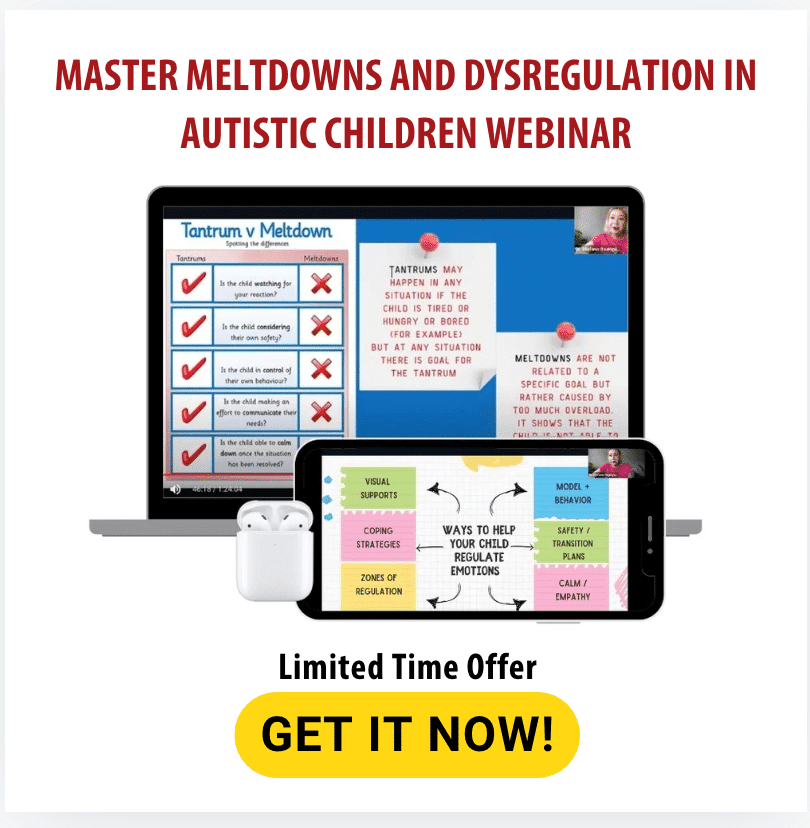Autism bossy habits can confuse dad and mom and caretakers. In some events, it will probably seem that an autistic individual is making an attempt to regulate one thing or act in a fashion that places them in management over others.
Nevertheless, a lot of what appears to be bossiness really displays deeper struggles with anxiousness, issue with social interplay, or inflexible pondering. All of those will be core options of autism spectrum dysfunction.
As an grownup, a superb understanding of human habits usually and why this habits occurs is essential in educating autistic youngsters higher methods of coping with these conditions.

Obtain your FREE information on
Autism Conduct Interventions
Understanding bossy habits in autistic youngsters
A few of the behaviors in autistic youngsters that some could interpret as bossy or controlling could embody telling folks what to do or behave.
This can be evident in relationships, akin to with household, faculty friends, and different social gatherings.
These behaviors could stem from challenges in sustaining eye contact and deciphering feelings and social cues, that are important for understanding social interactions.
They aren’t often making an attempt to be impolite or hurtful, however they might simply have a really sturdy preoccupation with how they really feel issues ought to go.
For instance, after I was round six and created practice tracks at residence with my brother, I’d insist on at all times ensuring a observe goes below the bridge. If my brother constructed the practice observe otherwise, I’d lose my mood.
What causes autism bossy habits?
In autistic youngsters, bossy habits could also be influenced by varied components. One of many principal autistic traits that may contribute to bossy habits is impaired social communication and interplay.
These autistic people could not totally perceive among the social etiquette of behave in informal conversations and even group actions. This may make them seem self-centered or controlling.
Many autistic youngsters also can have social anxiousness, which can vary from small discuss to common play actions. Bossy habits will be one of many quite a few options to deal with that anxiousness.

By ensuring that issues round them are managed with a robust focus, they guarantee that there’s predictability and order for his or her consolation, which can in any other case seem chaotic.
Youngsters recognized with pathological demand avoidance (PDA), a subtype of autism spectrum dysfunction, usually expertise an intense urge to regulate their setting. This habits is essentially pushed by their excessive avoidance of calls for positioned upon them.
This demand avoidance is usually a self-balancing mechanism once they expertise overwhelming emotions of hysteria or concern.
Administration suggestions and methods
Mother and father and caregivers will be very instrumental in guiding autistic people on handle bossy habits. Listed here are 5 tips about how you should use them successfully.
1. Be certain there are clear boundaries
Autistic youngsters do rather well when conditions have tons of construction. It’s best to attempt to set clear expectations for habits, serving to them perceive applicable methods to work together with others.
For instance, if they’ve an intense have to take management of household enjoyable actions, you’ll find a system the place every will get a flip at main.
2. Educate flexibility
Autistic people can usually suppose rigidly. To handle any points with this, you’ll be able to encourage your little one to be extra versatile of their pondering.
For example, in case your little one is inflexible about making a craft in a selected manner, as a substitute of getting aggravated, you’ll be able to present them varied methods to make it.
You can even have interaction in some role-playing to show them social eventualities the place youngsters might be required to share management or compromise.
3. Assist emotional understanding
Many autistic folks can miss others’ feelings and physique language, which may, sadly, result in damage emotions and social conflicts.
Instructing your little one to know and appropriately reply to others’ feelings will assist them keep away from bossy behaviors of their interactions with different folks.
4. Be totally conscious of sensory challenges
Sensory sensitivities with fluorescent lights or loud noises are different difficulties autistic folks could face. When the setting is an excessive amount of to bear, they may boss others round to aim to regulate their environment.
Creating an setting with out sensory triggers can reduce management points.
5. Encourage self-confidence
More often than not, the controlling behaviors autistic youngsters exhibit are related to anxiousness. Due to this fact, serving to them really feel extra self-confident could lower this habits.
Encouraging them to precise their emotions and educating them methods to handle social anxiousness can go a great distance.
When to hunt skilled assist
Whereas steering on bossy habits at residence could also be efficient in stopping battle, there are these instances when skilled assistance is required.
In case your little one struggles with conflicts in school or inside the household, and there aren’t any indicators of enchancment, it might be time to hunt assist.
If they appear unable to handle social conditions regardless of your efforts or grow to be overly centered on particular pursuits to the purpose of resisting different actions, consulting a therapist or autism specialist may very well be useful.
Indicators that it’s time to search assist are:
- elevated anxiousness,
- withdrawal from social interplay,
- an elevated preoccupation with the necessity to management issues
These and different indicators ought to be long-term and never simply one-day conditions.
Assist and understanding
Bossy habits within the context of autism requires persistence, empathy, and understanding. Autistic behaviors are sometimes a manner to deal with the challenges they face in a world that may be complicated and overwhelming.

With applicable help, methods, and elevated consciousness of the triggers for such behaviors, dad and mom and caregivers can successfully assist autistic youngsters deal extra efficiently with their social environments.
FAQs
Q: Do folks with autism have management points?
A: Controlling behaviors amongst autistic people can happen for varied causes, akin to managing anxiousness or creating predictability round conditions that don’t meet their want for routine.
Q: What are autism manipulative behaviors?
A: An necessary factor to recollect is that what looks like manipulative habits in autistic folks is commonly a results of difficulties understanding social guidelines.
Q: What makes autistic people offended?
A: Autistic people could grow to be offended once they expertise sensory overload, adjustments in routine, or misunderstandings throughout social interactions.
References
Hodges H, Fealko C, Soares N. Autism spectrum dysfunction: definition, epidemiology, causes, and medical analysis. Transl Pediatr. 2020 Feb;9(Suppl 1):S55-S65. doi: 10.21037/tp.2019.09.09. PMID: 32206584; PMCID: PMC7082249.
Kodak T, Bergmann S. Autism Spectrum Dysfunction: Traits, Related Behaviors, and Early Intervention. Pediatr Clin North Am. 2020 Jun;67(3):525-535. doi: 10.1016/j.pcl.2020.02.007. Epub 2020 Might 4. PMID: 32443991.
Montaser J, Umeano L, Pujari HP, Nasiri SMZ, Parisapogu A, Shah A, Khan S. Correlations Between the Growth of Social Anxiousness and People With Autism Spectrum Dysfunction: A Systematic Evaluation. Cureus. 2023 Sep 7;15(9):e44841. doi: 10.7759/cureus.44841. PMID: 37809175; PMCID: PMC10559833.
Nair AS, Priya RS, Rajagopal P, Pradeepa C, Senthil R, Dhanalakshmi S, Lai KW, Wu X, Zuo X. A case examine on the impact of sunshine and colours within the constructed setting on autistic youngsters’s habits. Entrance Psychiatry. 2022 Nov 30;13:1042641. doi: 10.3389/fpsyt.2022.1042641. PMID: 36532166; PMCID: PMC9748440.
Overskeid G. Energy and Autistic Traits. Entrance Psychol. 2016 Aug 31;7:1290. doi: 10.3389/fpsyg.2016.01290. PMID: 27630593; PMCID: PMC5005963.
Petrolini V, Jorba M, Vicente A. What does it take to be inflexible? Reflections on the notion of rigidity in autism. Entrance Psychiatry. 2023 Feb 13;14:1072362. doi: 10.3389/fpsyt.2023.1072362. PMID: 36860504; PMCID: PMC9969081.
Volden J, Sorenson A. Bossy and good requests: various language register in audio system with autism spectrum dysfunction (ASD). J Commun Disord. 2009 Jan-Feb;42(1):58-73. doi: 10.1016/j.jcomdis.2008.08.003. Epub 2008 Sep 4. PMID: 18930471.
White R, Livingston LA, Taylor EC, Shut SAD, Shah P, Callan MJ. Understanding the Contributions of Trait Autism and Anxiousness to Excessive Demand Avoidance within the Grownup Common Inhabitants. J Autism Dev Disord. 2023 Jul;53(7):2680-2688. doi: 10.1007/s10803-022-05469-3. Epub 2022 Apr 18. PMID: 35437676; PMCID: PMC9015283.


